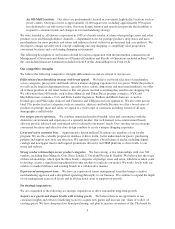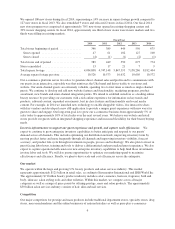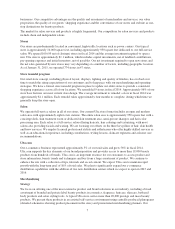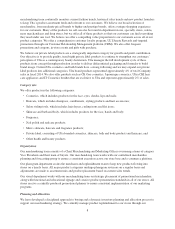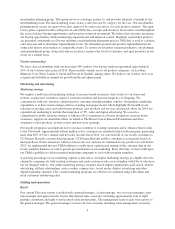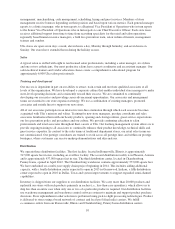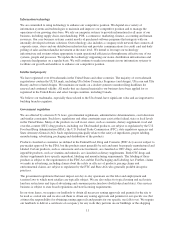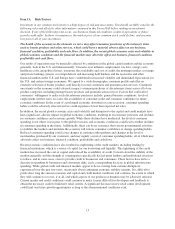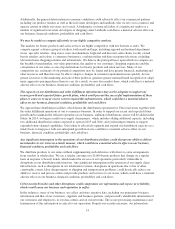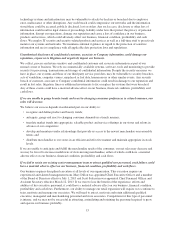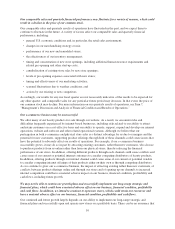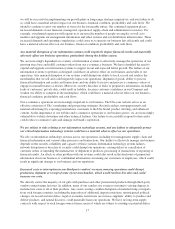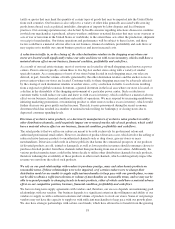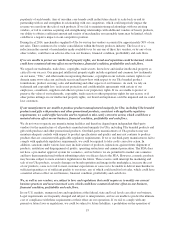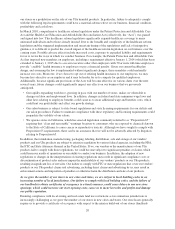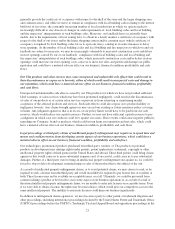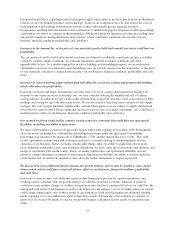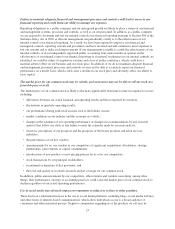Ulta 2014 Annual Report Download - page 17
Download and view the complete annual report
Please find page 17 of the 2014 Ulta annual report below. You can navigate through the pages in the report by either clicking on the pages listed below, or by using the keyword search tool below to find specific information within the annual report.Item 1A. Risk Factors
Investment in our common stock involves a high degree of risk and uncertainty. You should carefully consider the
following risks and all of the other information contained in this Form 10-K before making an investment
decision. If any of the following risks occur, our business, financial condition, results of operations or future
growth could suffer. In these circumstances, the market price of our common stock could decline, and you may
lose part or all of your investment.
The health of the economy in the channels we serve may affect consumer purchases of discretionary items
such as beauty products and salon services, which could have a material adverse effect on our business,
financial condition, profitability and cash flows. In addition, the recent global economic crisis and volatility in
global economic conditions and the financial markets may adversely affect our business, financial condition,
profitability and cash flows.
Our results of operations may be materially affected by conditions in the global capital markets and the economy
generally, both in the U.S. and internationally. Concerns over inflation, employment, tax laws, energy costs,
healthcare costs, geopolitical issues, terrorism, the availability and cost of credit, the mortgage market, sovereign
and private banking systems, sovereign deficits and increasing debt burdens and the real estate and other
financial markets in the U.S. and Europe have contributed to increased volatility and diminished expectations for
the U.S. and certain foreign economies. We appeal to a wide demographic consumer profile and offer an
extensive selection of beauty products sold directly to retail consumers and premium salon services. Continued
uncertainty in the economy could adversely impact consumer purchases of discretionary items across all of our
product categories, including prestige beauty products and premium salon services. Factors that could affect
consumers’ willingness to make such discretionary purchases include: general business conditions, levels of
employment, interest rates, tax rates, the availability of consumer credit and consumer confidence in future
economic conditions. In the event of a prolonged economic downturn or acute recession, consumer spending
habits could be adversely affected and we could experience lower than expected net sales.
In addition, the recent global economic crisis and volatility and disruption to the capital and credit markets have
had a significant, adverse impact on global economic conditions, resulting in recessionary pressures and declines
in consumer confidence and economic growth. While these declines have moderated, the level of consumer
spending is not where it was prior to the global recession, and economic conditions could lead to further declines
in consumer spending in the future. Additionally, there can be no assurance that various governmental activities
to stabilize the markets and stimulate the economy will restore consumer confidence or change spending habits.
Reduced consumer spending could cause changes in customer order patterns and changes in the level of
merchandise purchased by our customers, and may signify a reset of consumer spending habits, all of which may
adversely affect our business, financial condition, profitability and cash flows.
Recent economic conditions have also resulted in a tightening of the credit markets, including lending by
financial institutions, which is a source of capital for our borrowing and liquidity. This tightening of the credit
markets has increased the cost of capital and reduced the availability of credit. Concern about the stability of the
markets generally and the strength of counterparties specifically has led many lenders and institutional investors
to reduce, and in some cases, cease to provide credit to businesses and consumers. These factors have led to a
decrease in spending by businesses and consumers alike, and a corresponding decrease in global infrastructure
spending. While global credit and financial markets appear to be recovering from extreme disruptions
experienced over the past few years, uncertainty about continuing economic stability remains. It is difficult to
predict how long the current economic and capital and credit market conditions will continue, the extent to which
they will continue to recover, if at all, and which aspects of our products or business may be adversely affected.
Current market and credit conditions could continue to make it more difficult for developers and landlords to
obtain the necessary credit to build new retail centers. A significant decrease in new retail center development
could limit our future growth opportunities as long as the aforementioned conditions exist.
13



